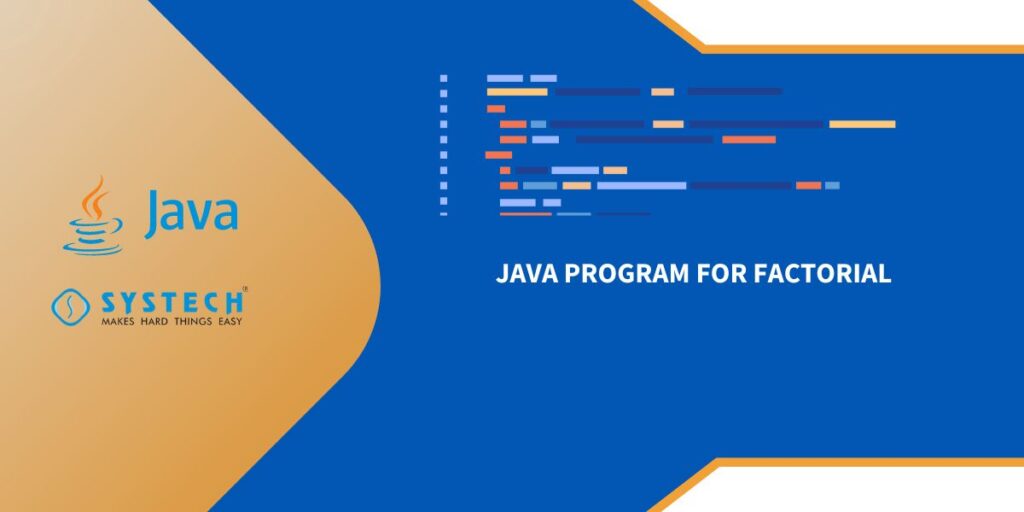Reading Time: 7 minutes
Introduction:
The provided Java program is a simple factorial calculator that takes a non-negative integer as input from the user, calculates its factorial using recursion, and then displays the result. Factorial is the product of all positive integers up to a given number. The program ensures that the input is a non-negative integer and provides an error message if an invalid input is detected.
Explanation:
- Import Statement: The program starts by importing the Scanner class from the util package to facilitate user input.
- User Input: The main method prompts the user to enter a non-negative integer, which is then read using the Scanner
- Input Validation: The program checks if the entered integer is non-negative. If it is, the factorial is calculated; otherwise, an error message is displayed, and the program terminates.
- Factorial Calculation: The calculateFactorial method is a recursive function that computes the factorial of the input integer n. The base cases check if n is 0 or 1, in which case the factorial is 1. Otherwise, the factorial is calculated by multiplying n with the factorial of (n – 1).
- Display Result: If the input is valid, the program prints the calculated factorial for the entered integer.
- Scanner Closure: The Scanner is closed to release system resources.
Algorithm:
- Begin the program.
- Import the Scanner
- Create a Scanner object to read user input.
- Prompt the user to enter a non-negative integer.
- Read the entered integer.
- Check if the integer is non-negative.
- If negative, display an error message and terminate the program.
- If non-negative, proceed to the next step.
- Call the calculateFactorial method with the entered integer.
- The calculateFactorial method:
- If n is 0 or 1, return 1.
- Otherwise, return n * calculateFactorial(n – 1).
- Display the calculated factorial for the entered integer.
- Close the Scanner
- End the program.
Code:
import java.util.Scanner;
public class FactorialCalculator {
public static void main(String[] args) {
Scanner scanner = new Scanner(System.in);
System.out.print("Enter a non-negative integer: ");
int n = scanner.nextInt();
if (n < 0) {
System.out.println("Please enter a non-negative integer.");
} else {
long factorial = calculateFactorial(n);
System.out.println("Factorial of " + n + " is: " + factorial);
}
scanner.close();
}
private static long calculateFactorial(int n) {
if (n == 0 || n == 1) {
return 1;
} else {
return n * calculateFactorial(n - 1);
}
}
}
Input:
Enter a non-negative integer: 45
Output:
Factorial of 45 is: -8797348664486920192
This program prompts the user to enter a non-negative integer and then calculates its factorial using a recursive method. The calculateFactorial method is a recursive function that computes the factorial of the given integer.
FAQ’s
- Q: Is it possible to see an example of a Java program for calculating the factorial of a number?
- A: Absolutely! Check out this Java program for factorial, which takes a non-negative integer input and recursively calculates its factorial.
- Q: Can you share a Java program specifically designed for finding the factorial of a number?
- A: Certainly! Here’s a Java program that prompts the user for a non-negative integer and then computes its factorial using a recursive approach.
- Q: How can I create a Java program for factorial calculation?
- A: Creating a Java program for factorial is straightforward. You can input a non-negative integer, validate it, and then use a recursive method to calculate its factorial.
- Q: Is there a standard Java program to find the factorial of a number, or can it be customized based on requirements?
- A: While there isn’t a single standard program, a typical Java program to find the factorial of a number involves user input, validation, and a recursive method for factorial calculation.
- Q: What’s the general structure of a factorial Java program, and how can I implement one myself?
- A: A factorial Java program usually includes user input, validation, and a recursive method for factorial calculation. You can customize it based on your specific needs and preferences.

